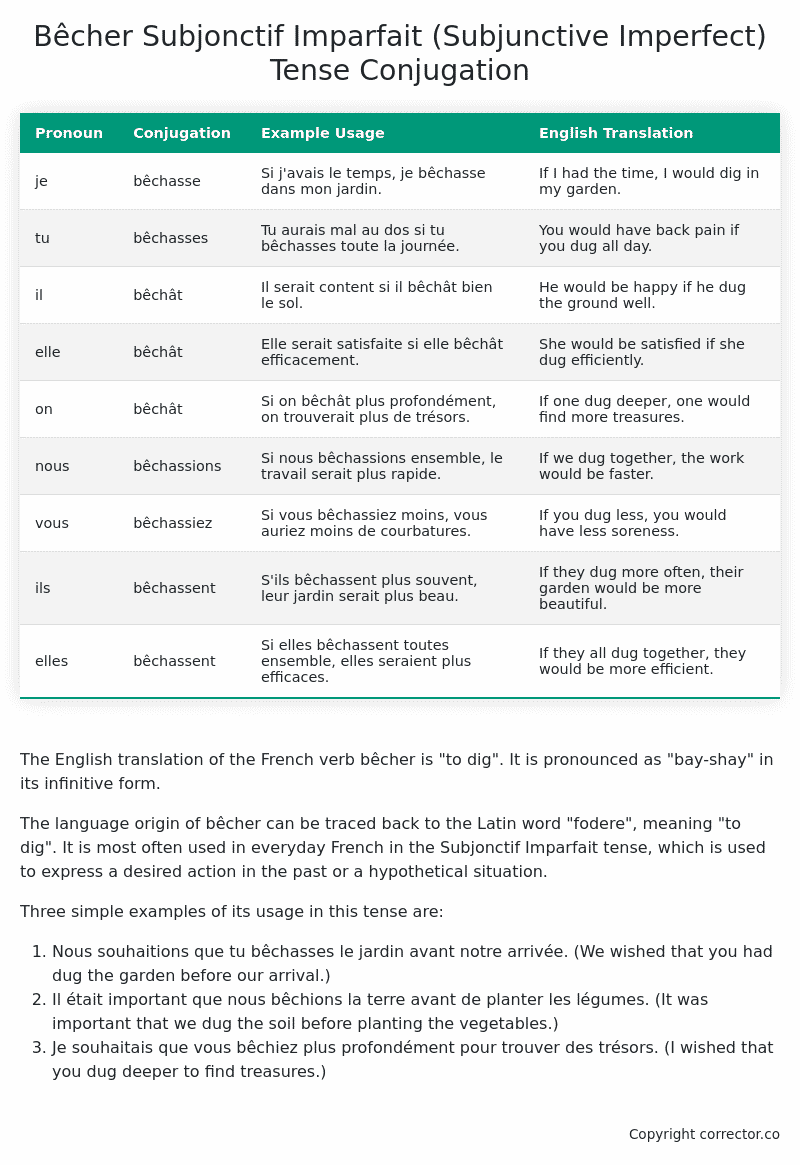Subjonctif Imparfait (Subjunctive Imperfect) Tense Conjugation of the French Verb bêcher
Introduction to the verb bêcher
The English translation of the French verb bêcher is “to dig”. It is pronounced as “bay-shay” in its infinitive form.
The language origin of bêcher can be traced back to the Latin word “fodere”, meaning “to dig”. It is most often used in everyday French in the Subjonctif Imparfait tense, which is used to express a desired action in the past or a hypothetical situation.
Three simple examples of its usage in this tense are:
- Nous souhaitions que tu bêchasses le jardin avant notre arrivée. (We wished that you had dug the garden before our arrival.)
- Il était important que nous bêchions la terre avant de planter les légumes. (It was important that we dug the soil before planting the vegetables.)
- Je souhaitais que vous bêchiez plus profondément pour trouver des trésors. (I wished that you dug deeper to find treasures.)
Table of the Subjonctif Imparfait (Subjunctive Imperfect) Tense Conjugation of bêcher
| Pronoun | Conjugation | Example Usage | English Translation |
|---|---|---|---|
| je | bêchasse | Si j’avais le temps, je bêchasse dans mon jardin. | If I had the time, I would dig in my garden. |
| tu | bêchasses | Tu aurais mal au dos si tu bêchasses toute la journée. | You would have back pain if you dug all day. |
| il | bêchât | Il serait content si il bêchât bien le sol. | He would be happy if he dug the ground well. |
| elle | bêchât | Elle serait satisfaite si elle bêchât efficacement. | She would be satisfied if she dug efficiently. |
| on | bêchât | Si on bêchât plus profondément, on trouverait plus de trésors. | If one dug deeper, one would find more treasures. |
| nous | bêchassions | Si nous bêchassions ensemble, le travail serait plus rapide. | If we dug together, the work would be faster. |
| vous | bêchassiez | Si vous bêchassiez moins, vous auriez moins de courbatures. | If you dug less, you would have less soreness. |
| ils | bêchassent | S’ils bêchassent plus souvent, leur jardin serait plus beau. | If they dug more often, their garden would be more beautiful. |
| elles | bêchassent | Si elles bêchassent toutes ensemble, elles seraient plus efficaces. | If they all dug together, they would be more efficient. |
Other Conjugations for Bêcher.
Le Present (Present Tense) Conjugation of the French Verb bêcher
Imparfait (Imperfect) Tense Conjugation of the French Verb bêcher
Passé Simple (Simple Past) Tense Conjugation of the French Verb bêcher
Passé Composé (Present Perfect) Tense Conjugation of the French Verb bêcher
Futur Simple (Simple Future) Tense Conjugation of the French Verb bêcher
Futur Proche (Near Future) Tense Conjugation of the French Verb bêcher
Plus-que-parfait (Pluperfect) Tense Conjugation of the French Verb bêcher
Passé Antérieur (Past Anterior) Tense Conjugation of the French Verb bêcher
Futur Antérieur (Future Anterior) Tense Conjugation of the French Verb bêcher
Subjonctif Présent (Subjunctive Present) Tense Conjugation of the French Verb bêcher
Subjonctif Passé (Subjunctive Past) Tense Conjugation of the French Verb bêcher
Subjonctif Imparfait (Subjunctive Imperfect) Tense Conjugation of the French Verb bêcher (this article)
Subjonctif Plus-que-parfait (Subjunctive Pluperfect) Tense Conjugation of the French Verb bêcher
Conditionnel Présent (Conditional Present) Tense Conjugation of the French Verb bêcher
Conditionnel Passé (Conditional Past) Tense Conjugation of the French Verb bêcher
L’impératif Présent (Imperative Present) Tense Conjugation of the French Verb bêcher
L’infinitif Présent (Infinitive Present) Tense Conjugation of the French Verb bêcher
Struggling with French verbs or the language in general? Why not use our free French Grammar Checker – no registration required!
Get a FREE Download Study Sheet of this Conjugation 🔥
Simply right click the image below, click “save image” and get your free reference for the bêcher Subjonctif Imparfait tense conjugation!

Bêcher – About the French Subjonctif Imparfait (Subjunctive Imperfect) Tense
Formation
Common Everyday Usage Patterns
Interactions with Other Tenses
Subjonctif Présent
Indicatif Passé Composé
Conditional
Conditional Perfect
Summary
I hope you enjoyed this article on the verb bêcher. Still in a learning mood? Check out another TOTALLY random French verb conjugation!


